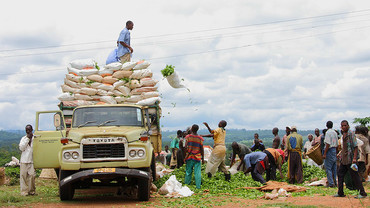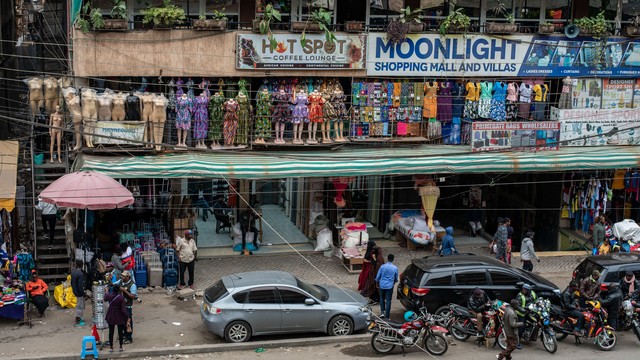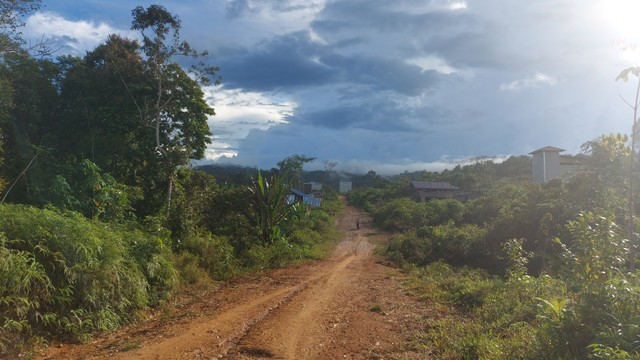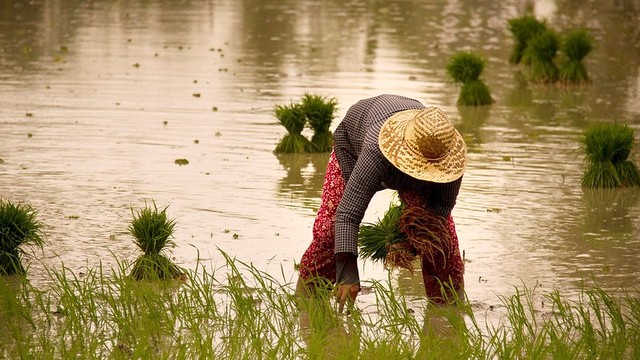Rebalancing power in the Kenya-UK green bean value chain
Farmers and workers often struggle to influence decision-making and trading patterns within global value chains. A recent IIED webinar discussed an initiative to overcome hurdles for farmers and workers to secure a stronger voice and influence trading arrangements within the Kenya-UK green bean value chain.



Freshly picked Kenyan green beans (GlobalHort Image Library/Imagetheque, via Flickr, CC BY-NC 2.0)
Power asymmetries in global value chains mean farmers and workers often experience unpredictable and unsecure incomes, and risks and benefits are unevenly distributed along the chain. Farmers and workers have little opportunity and few capabilities to negotiate terms that secure their rights or improve their working conditions and livelihoods.
An IIED-hosted webinar looked at how to rebalance power within global value chains, focusing on an initiative developed in connection with the Kenya-UK green bean value chain. The initiative was implemented by the Kenya Human Rights Commission (KHRC), Traidcraft Exchange, in collaboration with UK retailer Marks & Spencer (M&S), and Flamingo Horticulture, an exporter based in the UK and Kenya. It was supported by funds from Comic Relief. The project reached 300 smallholder farmers and 3,000 workers in Kenya between 2013 and 2016.
The webinar panellists were Mary Kambo, labour rights programme advisor at KHRC; Kashara Kitonga, coordinator of the Meru-Lewa Horticulture Producers and Exporters Cooperative Society in Kenya and a smallholder farmer formerly supplying green beans to Flamingo Horticulture; Hazel Culley, senior food sustainable product and raw material manager at M&S; and Tom Wills, policy advisor at Traidcraft Exchange.
Mary Kambo described the project, saying it had established an unprecedented level playing field for dialogue between workers, farmers, the exporter and the retailer. She said the project had achieved significant positive changes, including:
- The exporter being clearer about the reasons for rejecting beans, meaning farmers could produce the right amounts and better quality according to market demands
- The retailer changing order patterns and package sizes to reduce food waste, resulting in more income for the farmers, and
- The exporter signing a pledge with a minimum guaranteed volume and a raise on the minimum price for the beans, giving more predictability of income for farmers.
Benefits and challenges for supply chain actors
Kitonga said the initiative had brought great benefits to farmers – including helping them to understand how the chain works, and building their capacity to negotiate and their knowledge of how to improve production.
Culley also said the project had generated a lot of learning for M&S, including on how to create a platform in which everyone had a voice, as opposed to the retailer being in the driving seat.
Culley said the process was not without its challenges. Buyers at M&S deal with large numbers of value chains and suppliers. Engagement with a wide range of actors took time, and it might be difficult to replicate the initiative in different contexts.
Panellists raised questions about the voluntary nature of the process. The dialogue generated an ‘action list of commitments’ for the different actors – which led to positive changes, including those highlighted above. But the list and dialogue process were not written into legally binding contracts: instead the process was largely voluntary and ultimately relied on goodwill of all parties.
The commitments did translate into some binding provisions on buyer-farmer contracts, for example a “pledge” on minimum volume and a raise in the minimum price, but at the end of the project not all issues had been addressed.
Other challenges included the cost of convening meetings, and for M&S, sustaining the process through staff turnover and internal transitions. Kambo also noted a lack of potential legal and other recourses if deadlocks do occur in voluntary dialogues.
To formalise or not to formalise?
Panellists debated the pros and cons of formalising the process and the voluntary commitments. The panellists seemed to agree that signatures from the different participating partners in a document could be helpful.
Culley said that ‘over-bureaucratising’ the approach could make it more difficult for companies to engage – but a light touch legal document could help address staff turnover issues.
Lessons for success: building trust
Panellists agreed on the value of two key strategies to ensure a level playing field: first, the preparatory work, including training, that KHRC did with farmers and workers ahead of the dialogue, and second, the role Traidcraft Exchange played as independent facilitator to ensure a level playing field.
Wills said building trust and preparing all parties for difficult conversations was essential. He said only if there is long-term commitment to suppliers, can challenges be overcome. Kambo reported that KHRC helped farmers to learn about the challenges that exporters and retailers face and to prioritise their issues for buyers to address in the first instance.
Where to go from here: replication and upscaling
All panellists agreed on the need to scale up the approach, both to more farmers and workers – beyond those involved in the project - and across other value chains. The exporter, KHRC and M&S are all exploring the potential for adapting the approach to other supply chains. This will inevitably be resource and time intensive.
Panellists emphasised the need for cost-effective mechanisms to bring geographically-spread actors together to continue dialogue beyond project timeframes and to replicate it in new contexts. In this regard, M&S is considering trying other modes of communication and looking at buyer training with a view to improving supply chain relationships.
Additional resources
The presentation by Mary Kambo is available on IIED's SlideShare site. A recording of the webinar can be viewed below and on IIED’s YouTube channel.
Rebalancing power in global food chains through a “ways of working” approach: an experience from Kenya, in which KHRC describes one of the project’s activities from a socio-legal empowerment perspective.
Adapting commercial practices and enhancing lives of smallholders and workers in Kenya: a report in which Flamingo Horticulture, M&S and Traidcraft Exchange outline the project’s key activities in more detail.
The webinar was part of IIED’s Empowering Producers in Commercial agriculture (EPIC) initiative, funded by UK Aid from the UK government through its Commercial Agriculture for Smallholders and Agribusiness (CASA) programme. CASA seeks to increase economic opportunities for smallholders by demonstrating the commercial viability of businesses with significant smallholder supply chains and by attracting more investment into the sector.
About the author






